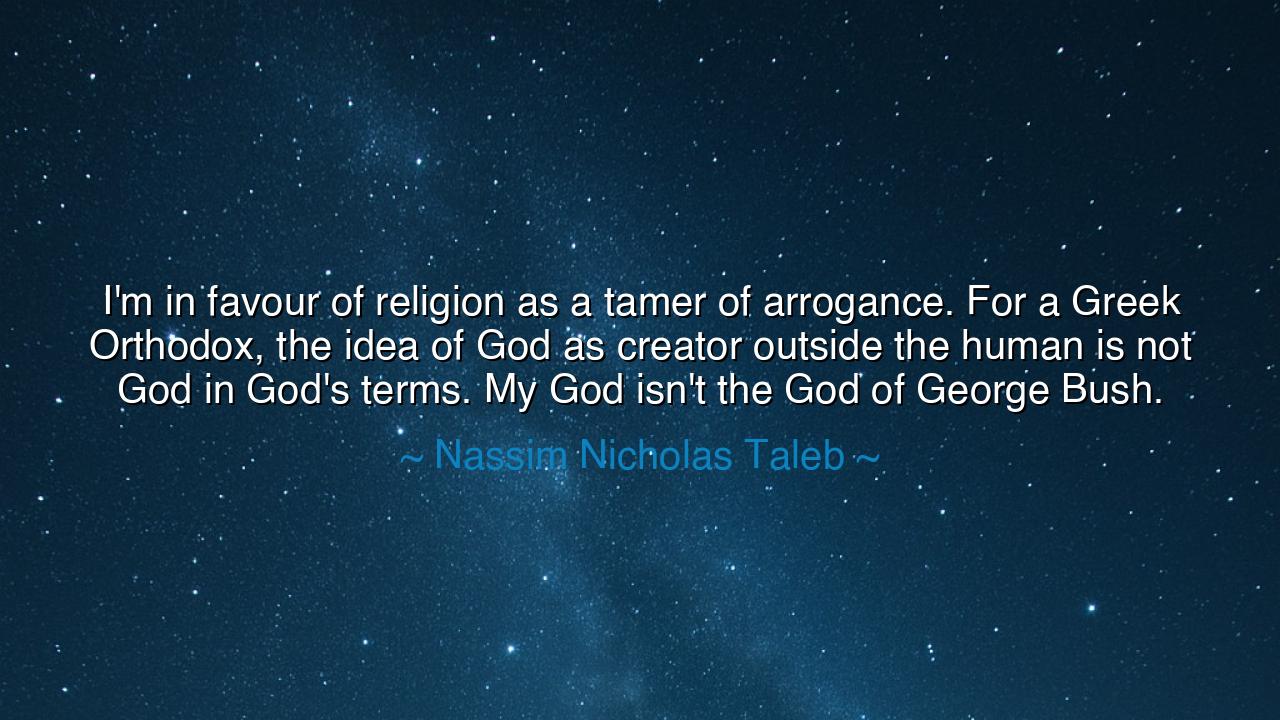
I'm in favour of religion as a tamer of arrogance. For a Greek
I'm in favour of religion as a tamer of arrogance. For a Greek Orthodox, the idea of God as creator outside the human is not God in God's terms. My God isn't the God of George Bush.






In the rich and enduring tapestry of religion, there exists a powerful truth: that faith, when rightly understood, serves as a humbling force that tempers the pride of human arrogance. Nassim Nicholas Taleb, the philosopher and thinker, speaks to this truth when he states, "I'm in favour of religion as a tamer of arrogance. For a Greek Orthodox, the idea of God as creator outside the human is not God in God's terms. My God isn't the God of George Bush." These words carry with them a deep wisdom that calls us to reflect on the nature of the divine and the profound humility that true faith demands of us. The God of the ancients was not a distant figure of power, but a presence that dwelt intimately with the people, teaching them to live humbly and with a deep respect for the world and each other.
The wisdom of the Greek Orthodox tradition, which Taleb draws upon, emphasizes a profound truth: God, in the truest sense, is not a figure of human construction, a deity to be wielded for our own purposes or to justify our own arrogance. God is beyond human comprehension, yet intimately involved in the lives of those who seek to understand the divine mysteries. The ancient Greek philosophers, from Plato to Aristotle, spoke of God as the Unmoved Mover, the ultimate source of order and reason in the universe, yet also as a force that called humanity to live virtuously and humbly. The true nature of God, according to this tradition, is not one of grandeur detached from the human experience, but of an active and ever-present force that calls us to humility and self-reflection.
This is a far cry from the God that Taleb rejects—the one that is wielded as a weapon, the God used to justify power, control, and dominion over others. The God of George Bush, as Taleb suggests, is one that is invoked to justify actions of war, dominance, and pride. Such a God is not the true God of the ancient teachings but a God made in the image of human desires for control. This distorted view of God fosters the arrogance that has led to the countless wars, injustices, and suffering throughout history. When God is turned into a tool for human ambition, the divine essence is lost, and humanity is led astray from the path of humility and understanding.
The ancient Hebrew prophets also warned against such distortions of the divine. Isaiah, in his writings, spoke of God as a sovereign being, exalted above all creation, yet a God who desires justice, compassion, and humility from his people. In the same way, Jesus, in his teachings, turned the common understanding of God upside down, showing that God does not dwell in earthly power or arrogance but in love, mercy, and humility. Jesus spoke of a Kingdom of God that was not of this world, not a realm of dominion or conquest, but one where the meek would inherit the earth. This radical message of humility and love stands in stark contrast to the prideful and self-serving use of religion for personal gain or power.
The lives of great leaders and thinkers throughout history bear witness to this truth. Mahatma Gandhi, who led India to independence, was a deeply spiritual man, but his understanding of God was not one of domination, but of love and non-violence. Gandhi’s religion was a tamer of arrogance, teaching him to live humbly and with reverence for all life. He understood that true power came not from conquest, but from the humility of service to others. His example teaches us that religion, when rightly understood, does not inflate the ego but deflates it, urging us to act with compassion and humility.
The lesson that Taleb imparts is both a call to humility and a warning against the arrogance that can arise from a distorted view of religion. Faith, when aligned with the divine truth, is a powerful force for good in the world, a force that calls us to act with justice, love, and humility. Religion, when practiced as a tamer of arrogance, helps us to see beyond our ego and our desire for power, urging us to live in harmony with the world around us. The divine does not exist to serve our ambitions, but to guide us toward a life of virtue, compassion, and humility.
In our own lives, we must ask ourselves: do we use religion to justify our arrogance, our desire for power, or our ambitions, or do we allow it to humble us, to open our hearts to compassion and service? Taleb’s words challenge us to reconsider the true purpose of faith and to embrace a vision of God that calls us to live humbly, to reject the pride of power, and to seek justice and mercy for all. Religion is not a tool for personal gain, but a guide to living in harmony with the divine and with each other. Let us strive to live in this way, recognizing that the greatest spiritual power comes not from dominance, but from humility, love, and the wisdom of the divine.






AAdministratorAdministrator
Welcome, honored guests. Please leave a comment, we will respond soon